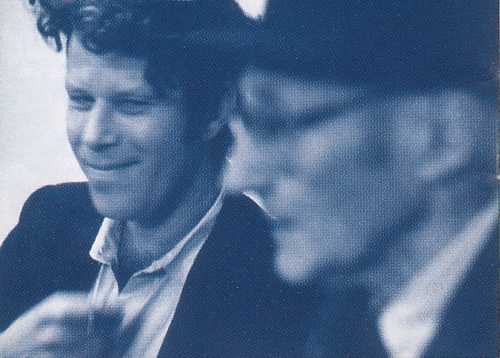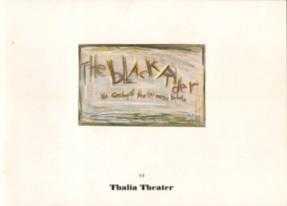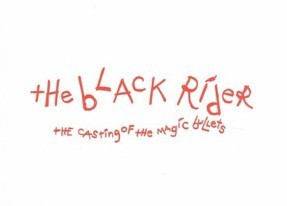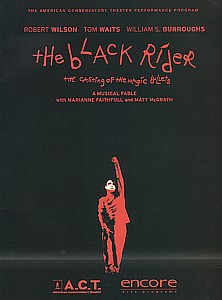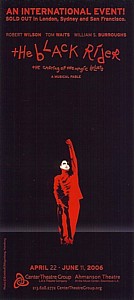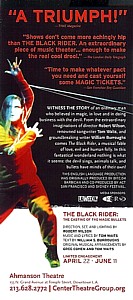The Black Rider: Introduction
In 1988/ 1989 Robert Wilson approached Tom Waits to be involved in his next play The Black Rider. Waits had only seen one Wilson production, Einstein On The Beach at the Brooklyn Academy of Music/ New York City (December, 1984).
Tom Waits: "I was unable to fully return to waking for weeks. Wilson's stage images had allowed me to look through windows into a dusting beauty that changed my eyes and my ears permanently."(1).
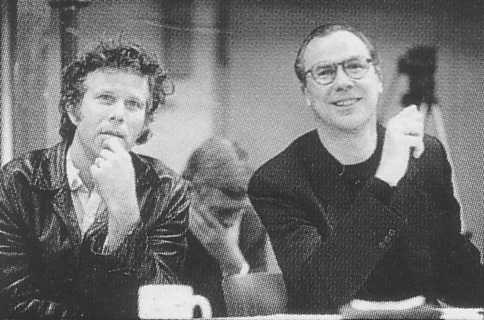
Tom Waits and Robert Wilson at The Black Rider rehearsals(6)
In 1987 Waits had his theatrical debut with Frank's Wild Years (St. Briar Street Theatre, Chicago). Waits had asked Wilson to produce it, but he couldn't make it. The 1987 video for: Blow, Wind Blow was shot in an early 20th century German cabaret style. And Waits's tour for Frank's Wild Years/ Big Time had turned into an expressionist theatrical show. Waits was ready for experimental theatre.
|
|
Then there was beat guru William Burroughs, who was going to deliver the libretto for The Black Rider. Tom Waits: "We all went to meet William [Burroughs] in Lawrence [Kansas]. Greg Cohen and Robert Wilson and myself. And we talked about this whole thing. It was very exciting, really. It felt like a literary summit. Burroughs took pictures of everyone standing on the porch. Took me out into the garage and showed me his shotgun paintings. Showed me the garden. Around three o'clock he started fondling his wristwatch as we got closer to cocktail hour. He was very learned and serious. Obviously an authority on a wide variety of topics. Knew a lot about snakes, insects, firearms."(8) |
Waits just had to step in, he couldn't turn this down. He might even have had less obvious reasons to feel attracted to the play. It is about deals with the devil and addictions of all kinds. Waits was in the middle of fighting some modern day devils himself (Cohen, Frito-Lay) and he had already sworn of those other Magic Bullets (drinking, smoking, dope, selling out). The three working together would prove to be an extremely successful collaboration. The 2 1/2 hour play premiered March 31, 1990 at the Thalia Theater, Hamburg/ Germany. It staged at a cost of $1.75 mln.
This remarkable collaboration has led to some misunderstanding. Waits did not write the play! The play was directed and designed by Robert Wilson. That is: the entire structure of the play, stage design, artwork, actor's movements and gestures, everything visual (it is essential to keep in mind that Wilson wanted the play to be a (black) comedy). William Burroughs added texts (libretto) inspired by the original German/ Bohemian folktale called Der Freisch�tz (best known for the fact it is the tale underlying Carl Maria von Weber's 1821 opera Der Freisch�tz).
The theatre program for The Black Rider lists these sources:
- "Der Freikugelgu� des Schreibers" (1750). From: "Die Sagen der Monathlichen Unterredungen Otto von Grabens zum Stein", published by Will-Erich Peuckert (Corpus Fabularurn 1), Berlin 1961 (the theatre program has a translation by Brigitte Helbling entitled "The Casting Of The Magic Bullets");
- "Der Freisch�tz. Eine Volkssage" (1810). From: "Gespensterbuch", published by von August Apel and Friedrich Laun, Leipzig o. J. (this is the original German folktale underlying Carl Maria von Weber's opera "Der Freisch�tz");
- "The Fatal Marksman" (1825). From: "Coleridge and Opium Eating and Other Writings by Thomas de Quincey", Edinburg 1965 (this is as a matter of fact an almost literal translation of "Der Freisch�tz. Eine Volkssage").
Der Freikugelgu� des Schreibers
(Sage aus den Monathlichen Unterredungen: Otto von Grabens zum Stein)
Translated as "The Casting of the Magic Bullets" by Brigitte Helbling
In a city in the kingdom of Bohemia there lived in the year 1710 a young man named Georg Schmid, who was about 18 years old and a clerk. This young man was on intimate terms with a hunter from the mountains nearby, who was acquainted with the magic arts. Our clerk had a passion for target shooting which he pursued always with an eye to his own advantage and gain; and for this reason he once applied to the hunter for advice, and the other promised that he would help him. His only condition was that the clerk go out with him on night of the 30th of July, which is Abdon's day, to cast some bullets; then he would receive 63 bullets, whereof 60 would not miss their mark, but the remaining three, which could not be distinguished from the others, would invariably fail. The clerk was blinded by his greed for money to the extent that he promised to take part in everything and could hardly await the coming of the appointed day. They then procured large forge coals, ladles, casting molds and other items that were necessary for their work, and at nightfall e took themselves to a crossroad which was about an hour away. As soon as they had arrived there, the hunter marked a wide circle around them with his hunting knife and placed certain characters on its edge which the clerk could not read. Then he directed the other to enter the circle and strip to the skin while denying god and the holy trinity. Hereafter, he ordered him to place the coals and casting things before him and advised him to take care that he finish his work between 11 and 12 o'clock, since if after that time a single bullet were missing he would belong to the devil. He also warned him not to let anything arrest him in what he was doing, no matter what might come to his attention, so as not to neglect his work. After impressing this warning on him, and commanding him to keep his silence whatever happened, both men formed a twofold spread-eagle and silently awaited the coming of the eleventh hour. The clock had hardly begun to strike when the dead coals sprang to life with fire as if they had been heated by a smith. In this way, they commenced with the casting of the bullets, but they had fabricated no more than a few when an old woman came towards them, laden with wooden scoops and raising a fearful racket. She asked them if they might not be wanting any of her goods? They, however, continued their work in silence and the hag disappeared before their eyes. Immediately afterwards, they heard several horse-drawn coaches coming from afar and heading directly towards them, which caused the clerk's flesh to creep not a little. Yet as soon as they had reached the circle, they swept over them like a strong current, like a stormwind rushing overhead. The coaches were hardly gone when a whole troop of horsemen could be heard advancing, and it, too, made its way through the air above them. Finally, they heard a bugle sounding, and the howling of many dogs, and perceived at the same time a quarry rushing towards them and continuing its course with all the dogs above them. These were followed by a large party of hunters on horseback who were all very eager in their pursuit. Last came one riding slowly on a black horse, who halted before the circle and asked what their desire might be, since they were doing this work in his part of the country. As they were almost finished with casting, the hunter replied for himself and his companion: >> We have cast 63 bullets in your name, whereof three shall belong to you, but the others you must leave to us <<. Upon this the other demanded that they hand him the ladle with the bullets, but the hunter said: >> We have cast them in your name, and since our time is not up yet they belong to us<<. Directly the other, gnashing his teeth threw something on it which evoked such a terrible stench that both men fell to the ground, scattering the bullets around them. They remained in this way until daybreak, when the hunter presently revived, being used to such doings, but the clerk found himself incapable of stirring from the spot. The other gathered his bullets and hurried towards the nearest village where he made known that a poor sick man was lying on the road nearby. Without saying anything else or even stopping a moment longer he then decamped, making his way through sequestered countryparts to the mountains surrounding Salzburg. When the half-dead clerk had been removed to the city and was questioned by clerical and secular courts as to what had befell him, and when he had finally, after many exertions, revealed what had taken place, he was immediately put into custody, notwithstanding his illness. After having recovered to a certain extent, he was put to trial by inquisition as was the custom, and after he had confessed and given evidence he was tried by criminal procedure as well. He was then convicted to death by the sword to be burned after, but due to various intercessions and in consideration of his youth the judgement pronounced was mitigated, and he was sentenced to six years imprisonment with hard labour.
Burroughs interpreted the original folktale, added modern Anglo-American implications and allusions (there are drugs related metaphors and there's even a Hemingway dialogue) and turned it into the libretto. That is: the actual spoken word fitting Wilson's ideas, directions and designs. Waits (collaborating with Greg Cohen and Gerd Bessler) added music and lyrics (having Wilson's theatre images and Burroughs' texts to be inspired by).
Tom Waits (1993): "His cut up text and open process of finding a language for this story became a river of words for me to draw from in the lyrics for the songs. He brought a wisdom and a voice to the piece that is woven throughout."(1)
Tom Waits (2006): "He (William Burroughs) wrote most of his words at his place in Lawrence (Kansas), and he'd send piles of material. Our dramaturge (would) edit and paste and cut and find the right spot for everything. Burroughs was just coughing up all this stuff, not writing in any linear way. Sometimes I would take something he wrote and turn it into a lyric. Sometimes we'd collaborate, like in "Just the Right Bullet." "To hit the tattered clouds you have to have the right bullets" - that's all Burroughs. "The first bullet is free" - that's me."(17)
Waits himself remained outside of the performance. He composed the songs and taught them to the actors in the Thalia Theatre production.
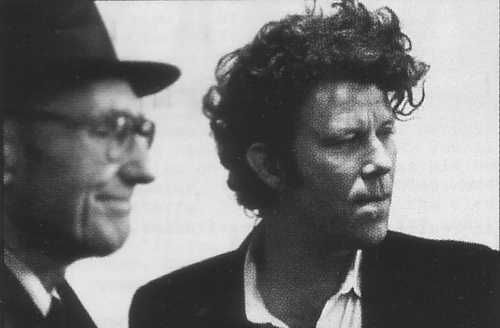
William Burroughs and Tom Waits at The Black Rider rehearsals(6)
The play became a huge success in Europe and to a lesser extent in the USA.
Tom Waits (2000): "That was a long project. But it got done and has played all over Europe. It only came to BAM [Brooklyn Academy of Music] once, you know. But over there, it's kind of, I dunno, I was gonna say like Cats or something . . . everybody knows it. But they're also more of a theater audience. They still participate in those traditions, whereas here [USA] it takes a lot to get folks out to a theater. Unless you tell 'em it's a movie first...or it's gonna be one" [laughs](7)
Tom Waits (2006): "It really caught on over there. It became kind of an underground version of "Cats" or something. It went all over the place, in high schools and colleges, and (it was) done by a lot of different theater companies."(17)
<object height="344" width="425"></object>
Waits' encore at "The Black Rider" premiere
Thalia Theater, Hamburg/ Germany. March 31, 1990
Taken from German WDR television documentary "The Black Rider - Der Schwarze Reiter", 1990 (Theo Janssen and Ralph Quinke)
Jackie Wullschlager (Financial Times of London): "For three hours of graceful, cold artifice, they (the actors) look, act, and sound like figures from silent movies...Wilson turns children's drawings into three-dimensional monstrosities. Crooked chairs, two meters high, dangle at odd angles...pine trees are scissor cut-outs which collapse and grow again like cartoons...Waits, sarcastic ballads, full of folk and blues and rock, call back the scarred idealism and mock simplicity of Kurt Weill, while Burroughs' monosyllabic banality has here found the setting which makes it seem perfect."(3)
The Black Rider Story(3)
The original story concerns a clerk, Wilhelm, who is in love with Katchen, daughter of the old forester, Kuno. Kuno wishes his daughter to marry a hunter. Katchen insists that a marksmanship contest be held to determine the finest hunter, hoping that Wilhelm might thus have a chance to win. Wilhelm, however cannot hit the broad side of a barn - until he is approached by a "dark horseman" called Pegleg. Pegleg arranges to give Wilhelm some "magic bullets," mysteriously guaranteed to hit anything Wilhelm aims at -except for one bullet, which Pegleg earmarks for his own purposes. Wilhelm wins the initial contest, and his bride's hand, but another shooting match is scheduled for their wedding day. Wilhelm asks Pegleg, who bears a suspicious resemblance to a leading citizen of the netherworld, for that last, unused bullet. Firing at a wooden dove, Wilhelm instead thanks to the cursed bullet - slays his bride. In Freischutz, divine intervention prevents Wilhelm from killing his bride, and he gets off the hook with a stern warning about dealing with the devil. In the Robert Wilson-directed rendition of the story, Wilhelm ends up raving mad, another strait-jacketed lunatic in Hell's traveling carnival. The final scene is of Pegleg, sleek in a tuxedo singing a mock-sentimental song written by Waits, "The Last Rose of Summer" which brings, "I love the way/The tattered cloud/Go wind across the sky...". Wilson's direction and, more obviously, Burroughs' libretto imbued The Black Rider with modern implications and allusions. At one point, the old forester, Kuno declares: "Some way he got into the magic bullets, and that leads straight to the devil's work, just like marijuana leads to heroin." Later, as Waits explained, "one of the actors comes out on stage, stands alone in a spotlight, talks about an argument between Hemingway and his agent - about selling out in Hollywood. Burroughs found some of the branches of the story, and let them grow into more metaphorical things in all of our lives every day that, in fact, are deals with the devil that we've made. What is cunning about those deals is that we're not aware we've made them. And when they come to fruitation, we are shocked and amazed."
Synopsis Of The Black Rider(10)
CHARACTERS: Pegleg. Kuno, the Old Forester. Bertram, the Forester. Anne, His Wife. K�thchen, Their Daughter. Wilhelm, a Clerk. Robert, a Hunting Boy. Wilhelm's Old Uncle. The Duke. His Messenger. A Bridesmaid. Young Kuno. Man on Stag. Georg Schmid. Warden. The Duke's Attendant. Ghosts Birds. Pegleg's Double. Wilhelm's Double.
PROLOGUE. Pegleg (the Devil) emerges from a large black box onstage and presents the characters of the play. Pegleg invites the audience to "come along with the Black Rider," promising "a gay old time." Old Uncle invites them to "step right up," but warns, "The Devil's bargain is always a fool's bargain."
SCENE 1. A room in the forestry. Bertram seeks advice from a portrait of his ancestor, Old Kuno. Bertram's daughter, K�thchen, wants to marry a young bookkeeper, Wilhelm. Bertram objects to the match because Wilhelm is not a competent hunter, which Bertram considers a sign of weakness. Kuno responds with baffling ambiguity, enigmatically repeating the phrase, "Do what thou wilt." As Bertram's frustration mounts, Anne enters, reminding him that they, too, were once young and in love. But Bertram is not convinced; he insists that his daughter must have a husband who can provide for her. Anne defends K�thchen's right to love whom she chooses. K�thchen and Wilhelm enter, and Wilhelm boldly proclaims his love for her. She returns his love, but is concerned about her father's disapproval. Wilhelm worries that K�thchen will not marry him without her father's consent and doubts that his poor hunting abilities will live up to Bertram's standards. Bertram warmly welcomes Robert, Wilhelm's rival for K�thchen's hand and Bertram's favored candidate. K�thchen, who finds Robert a braggart convinced of the value of his own prodigious hunting skills, as well as his irresistible appeal to the ladies repulsive, starts to run off. Robert catches her arm and tries to arouse her with his earthy woodsman's prowess. K�thchen remains unimpressed.
KNEE PLAY. ("Knee plays" are what director Robert Wilson calls the interludes he sometimes adds between acts to provide an antistructure that questions the main text.) The others exit, leaving Bertram alone to explain the risks of the woodsman's life: There's always a price to be paid for bounty taken from the forest, and the Devil will have his due. Wilhelm, a city boy who does not appreciate the worth of things in the forest, may not be able to "pay" for what he takes.
SCENE 2. The forest The Duke enters with his attendant and Kuno as a young man. The Duke tells a story from Kuno's youth: A man was caught prowling in the forest. He was bound to a stag, which was to drag him until he was dead. The Duke's ancestor, a prince, took pity on the trespasser, offering the forest as a reward to anyone who could "spare the man and hit the deer." Young Kuno took aim and shot the stag, without harming the man. The prince set the man free, but, suspicious of Kuno's skill, declared his achievement "a free shot" and ordered him to prove his skill definitively with another test, by shooting a white dove out of the sky. Kuno again hit his mark and received his prize. Ever since, this test has been the trial all foresters must successfully endure to earn their position. Kuno's triumph, however, left a debt to be paid by the generations that follow.
SCENE 3. A room in the forestry. K�thchen and Wilhelm sing their love to each other. By the end of the song, they are flying through the air. A giant gun appears beside them, and Wilhelm reaches for it.
KNEE PLAY. The gun falls gently to the ground and turns into a tree.
SCENE 4. Another part of the forest. Pegleg enters, leans a gun against the tree, and hides. Wilhelm enters, determined to prove himself as a competent marksman. He discovers the rifle and fumbles with it, entangling himself in its strap. Pegleg emerges, mocking Wilhelm's ineptness with the gun. A shooting gallery of wooden stags appears, which Wilhelm attempts to hit. Observing Wilhelm's pathetic failure, Pegleg offers him magic bullets. Wilhelm accepts them and this time, without even looking, hits every target.
SCENE 5. A room in the forestry. Night. K�thchen awakens from a nightmare of screaming birds to find her room filled with dead game. She comes upon Wilhelm sleeping next to a carcass. She rejoices that he has become a successful hunter, believing that her father will now allow them to marry. Bertram and Anne enter and bless their engagement. At the height of their collective joy, K�thchen is suddenly overcome by fear. She quickly talks herself out of it, however, and Wilhelm goes back to the forest to hunt again.
KNEE PLAY. Pegleg emerges from the dark. He, too, rejoices, knowing that he has also bagged his prey. He settles in to wait for the appropriate moment to collect his prize.
SCENE 6. Another part of the forest. Suspecting that dark powers are behind Wilhelm's success, Robert and the Old Uncle have come to the forest to spy on Wilhelm. Wilhelm enters with his gun. Animals appear; Wilhelm shoots and repeatedly misses. In a panic, Wilhelm wonders why he is suddenly no longer able to hit his mark. Pegleg appears as a huge shadow above the trees, taunting Wilhelm. After a brief chase, Wilhelm gets more bullets from Pegleg and loads his gun. Several animals appear and disappear before Wilhelm has the chance to shoot them. Finally, he fires into the air without aiming. A dead goose - it is K�thchen's falls from above. Wilhelm picks up the lifeless bird and exits.
KNEE PLAY. Robert and the Old Uncle predict Wilhelm's imminent doom.
SCENE 7. A room at the forestry. Early morning. K�thchen wanders about, still troubled by nightmares. A bridesmaid enters with her wedding dress, followed a moment later by Anne. A depressed Wilhelm enters dragging the dead goose, cursing his ill aim. K�thchen screams when she sees the goose. Their future now seems bleak. Robert leads Bertram into the room to show him what Wilhelm has done. The goose transforms into a vulture. Bertram tells Wilhelm that, although he is fond of him, their ways must part; Wilhelm has sold his soul and will have to repay his dire debt. A messenger arrives to announce the impending arrival of the Duke. The Duke has promised that if Wilhelm can shoot a certain wooden bird from a tree, he will win K�thchen's hand. A white veil appears (brought in by an unseen Pegleg); as the bridesmaid places the veil on K�thchen's head, however, it turns black. All are aghast. Wilhelm comforts K�thchen with a wedding song. All leave except Bertram.
KNEE PLAY. Bertram introduces the story of Georg Schmid, who made a deal with the Devil for magic bullets. Georg learned some hard lessons: that the Devil's magic can be addictive, and that some bullets are fated to hit a specific target, no matter where a man aims.
SCENE 8. A crossroads. Georg appears, building a magic circle of skulls and stones. By the time he has completed the task, he has gone completely mad. Wardens appear; they strap him into a straitjacket, place him on a stretcher, and carry him off.
SCENE 9. The forestry at night. Wilhelm tries to sneak out of the house, but he runs into a few obstacles: Bertram, on his way to bed; a sleepwalking Anne; a variety of objects; and finally Wilhelm's Old Uncle, who sternly advises him not to sell his soul. Old Uncle exits and Wilhelm is about to leave when K�thchen approaches. Wilhelm leads her to bed, kisses her goodnight, and exits. Old Kuno's portrait falls off the wall, nearly hitting K�thchen.
KNEE PLAY. Pantomime. Pegleg's double leads Wilhelm's double into the forest.
SCENE 10. Crossroads. Midnight. Wilhelm stands in the center, surrounded by various apparitions who attempt to scare him off. Wilhelm stands strong, however, and calls on Pegleg, demanding one last bullet. Pegleg appears and warns him that his bullets are not free. Pegleg gives Wilhelm seven bullets, saying, "Six are yours, and hit the mark; one is mine, and hits the dark." The seventh bullet is special, but Wilhelm is not to worry: "As K�thchen is your love ... you shall hit the little dove."
KNEE PLAY. Old Uncle tells the story of another Devil's bargain. Playing the parts of Ernest Hemingway, his agent, his wife, a gun dealer, vultures, and William S. Burroughs, Old Uncle dramatizes Hemingway's sellout to Hollywood.
SCENE 11. Pantomime in slow motion. The wedding party enters, all dressed in white. Pegleg enters and points to the wooden dove, sitting in a tree. Pressed by the Duke, Wilhelm prepares to shoot. K�thchen runs about, stricken with fear. The ghost of Old Kuno enters, and Pegleg leaves. Wilhelm aims his gun and fires. Instead of hitting his intended target, however, the bullet follows its own path to K�thchen, who falls to the ground dead. Pegleg returns, picks up K�thchen's corpse, and leaves. The wedding party disperses and Wilhelm is left alone. He breaks down.
KNEE PLAY. Now utterly mad, Wilhelm sings of memories from his past.
SCENE 12. Each character in the play appears and vanishes in a great cacophony of disjointed song, leaving only Pegleg.
EPILOGUE. Pegleg thanks the audience and introduces the band, The Magic Bullets, before singing his good bye with "The Last Rose of Summer."
Robert Wilson On The Black Rider(5)
The Black Rider is in twelve parts and a prologue. I had the idea that there would be indoor and outdoor scenes, man-made and natural environments, and that the scenes would alternate. I made a prologue to introduce the company. It begins with a black box standing up. The devil and the entire company come out of the box until they all stand in a line in front of the stage, as in a circus where all artists are introduced at the beginning. Then the devil sings a song: "Come on along with the Black Rider, we'll have a gay old time. Take off your skin and dance around in your bones. I'll drink your blood like wine. Come on along with the Black Rider, we'll have a gay old time..." Anyways, the audience gets a certain idea what the piece is going to be like. Then the characters disappear and the black box gets bigger and bigger, until the whole stage is engulfed in this black spot. The first scene takes place in the interior of a room, with an old family portrait on the back wall - played by an actor. The room is full of furniture, an enormous table and two enormous chairs. Wilhelm, who is a clerk, wants to marry K�thchen, but her father, the forester, wants someone who knows his way around in the forest and prefers Robert, the hunting boy. The second scene is outside - in a forest. There are expressionistic drawings of trees. It is a flashback scene, more colorful. In the third scene we go back to the interior space. The chairs and table are smaller - they get gradually smaller through the piece. In the beginning they fill the space, in the end they are very small. This is a love duet, and I thought to have the room filled with water; the furniture disappears and K�thchen and Wilhelm swim under water. The next scene is an exterior landscape. It is the meeting of Wilhelm and Peg Leg, the devil, next to a big tree. Wilhelm tries to shoot but fails. Then he meets the devil, gets the magic bullets, and shoots as many deer as in a shooting gallery. In scene five we go back to the house, and the room is full of dead animals. The father is very pleased that Wilhelm has become a good huntsman and has shot all these animals. He decides that Wilhelm can marry his daughter. In scene six Wilhelm goes back to the forest and shoots again, but he has spent all magic bullets and only gets a goose. In scene seven K�thchen is dressing for the marriage, but Wilhelm is in despair because he cannot shoot any more. Scene eight is another flashback - we have a cross-road and a Dutch landscape painting behind it. It is the story of Georg Schmid who got involved with devilish drugs. Then there is an intermission. In scene nine K�thchen sits on a strangely shaped bed, in German expressionist form. She sings a love song and the old family portrait falls on her head. Scene ten is the crossroads scene. We are in a forest, and the trees are hanging upside down. Wilhelm is frightened; the dead mother appears, and then the devil flies in on a chair and sings like a gospel preacher. Again Wilhelm gets magic bullets from him. In scene eleven we look through a window into the house, and the furniture is very small. Next to it is a tree with a dove on it. Wilhelm tries to shoot the dove but kills K�thchen instead. Then there is an interlude with Wilhelm going mad. In the last scene the black box comes back on stage. There are curtains with madhouses flying into them, and the whole company has gone mad and is eaten up by the black box. Then the devil enters the stage; somebody throws him a red rose, and he sings a song about the last rose of summer. Then he gets into the black box and the black box flies away. The Black Rider is about timing, because it is close to comedy. In some ways a comedy is much more difficult to do than something serious; you have to be serious when you do comedy, and it is the timing that makes it funny. The story is told visually, so Burroughs' text can be more abstract and Tom's songs are poetic and complement the story. The Black Rider was expressionistic, quick and colorful, and highly exaggerated.
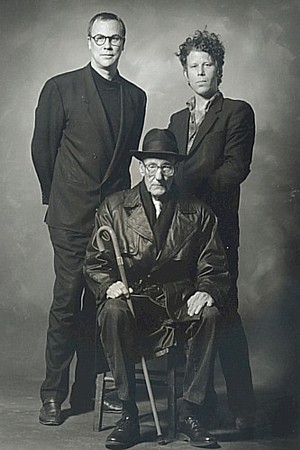
Robert Wilson, Tom Waits and William Burroughs
Photography by: Ralf Brinkhoff, 1993
William Burroughs On The Black Rider
William Burroughs (1990): "This is a war universe. War all the time. That is its nature. There may be other universes based on all sorts of other principles, but ours seems to be based on war and games. All games are basically hostile. Winners and losers. We see them all around us: the winners and the losers. The losers can oftentimes become winners, and the winners can very easily become losers. I recently completed a libretto called The Black Rider. It is based on a story by Thomas de Quincey that is a retelling of an old German folktale, also used by Karl Maria von Weber in his opera Der Freisch�tz. Our protagonist is a clerk, and he is in love with the forester's daughter, but the forester only wants a huntsman for a son in law. So our clerk goes out and tries to shoot but can't hit anything. Deep in the woods he is approached by Pegleg the Devil who tells him, "You gotta have the right kind of bullet." So he gives him the right kind of bullet. Naturally. The first one is always free Our clerk doesn't realize it, but he's made his pact with the Devil as soon as he picks up and uses the bullets. Before long he can't hit anything without 'em. He is completely dependent on the bullets. Soon the wedding day arrives and he must prove his marksmanship, but he's run out of magic bullets. When he fires at a wooden dove bobbing on a perch, the bullet whistles around and kills his betrothed. The moral is, the Devil's bargain is always a fool's bargain, because you're trying to get something for nothing, and you end up giving everything for nothing.... If the bullet's got my mark on it, I've had it. A special bullet for a special person. But if you know what your fate is, just by knowing it you have avoided it. They will have to change it.... The gun is a very simple mechanism. There are designs for guns that can be made with a pipe and a few odds and ends you can pick up from the hardware store. It's not to compare with a nice revolver or automatic, but it can certainly kill someone at close range with one shot. You can apply the whole Zen principle to firearms. Once you know where to point, all you have to do is get out of the way and let this thing happen. And then you can hit the target in the dark. It's all a matter of getting out of the way of yourself, or you're dead. Standing out of the way and letting what you really know take over. "To separate gun and hand and eye, until they do it on their own: Draw, aim, shoot, fire like a finely tuned machine. Both my hands should be unlinked, hand on trigger and hand on gun: and still as close as twins they think, both eyes open ... now just one ... My hand and eyes know how to shoot, and I have only to stand aside and free the shot, and freely shoot, to see the bullet ... in the bull's eye." (The Black Rider). Some weapons hit you right away; other weapons may take 500 years to hit. It's like that old joke: "Well, you missed me that time." "Oh yeah? Just try and move your head." Well, just try and shake your head 500 years from now. You won't even know you were hit." (11)
<object height="344" width="425"></object>
William Burroughs reading "Crossroads"
Excerpt from "The Black Rider - Der Schwarze Reiter" (1990)
German WDR television documentary on the making of The Black Rider
William Burroughs (1990): I knew nothing about it (Der Freisch�tz) before Bob Wilson asked me, but I saw immediately that this was the old devil's bargain, Faust, and so on. That's an interesting subject I have a word to say about. A devil's bargain is always a fool's bargain, particularly for an artist. The devil deals only in quantity, not in quality. He can't make someone a great writer, he can only make someone a famous writer, a rich writer. The more you depend on magic bullets, as in Freisch�tz finally you can't do anything without the magic bullets. We worked very hard; thank god it paid off. I never saw such an audience reaction.
Q: I heard there was a standing ovation of exactly 23 minutes at the premiere!
William Burroughs: Yes, exactly, wasn't it great? I don't know if they'll ever show it here in America. The devil's bargain is a classic, and in so many forms in Hollywood, advertising, job ads selling your soul, your integrity for games or money or for time. The ultimate form is for time, for immortality. (12)
Q (1990): Your shotgun paintings, in a sense, are a reverberation against the notorious action of fatally shooting your wife.
William Burroughs (1990): There's no real connection. Sure, well, it can't be helped. It doesn't matter.
Q: Have you ever written about that?
William Burroughs: No, but I've given accounts of it. I told Ted Morgan what happened, that's all. Once and for all.
Q: Is that one of the moral accountabilities that might determine your next life?
William Burroughs: That would be putting it in a very simplistic way. It isn't a question of morality anyway, it's a question of where you are now, your synchronicity, and how your actions affect your whole contacts, present, past, and future contacts. There's not morality involved. I'm not following any moral law.
Q: The call of "moral" is very Catholic, very cause and effect. It's too easy.
William Burroughs: Exactly. That's the war formula either/or. It's the barber's formula.
Q: It's obvious you keep striving for more.... You haven't laid down yet.
William Burroughs: Heaven no. I'm collaborating on an opera called The Black Rider with Bob Wilson.... It's an old German folktale about someone who's going to sell his soul to the Devil for magic bullets. So he gets these magic bullets from the Devil and of course, disaster. 'A devil's bargain is always a fool's bargain.
Q: You've never entered any bargain like that?
William Burroughs: God no. I'm not such a fool. This old Satan doesn't take me for dumber than I look. (13)
The Black Rider stagings(18)
Stagings (Wilson productions):
- Thalia Theater, Hamburg/ Germany, Mar. 31 (premiere), Apr. 2 - May 30, Sept. 16 - Nov. 3, December, 1990. January 27 - 31, March 16 - 18, 1991 (Wilson production).
- Theater an der Wien (Wiener Festwochen), Vienna/ Austria, June 12 - 16, 1990 (Wilson production).
- Théâtre du Châtelet (Festival d'Automne), Paris/ France, October 8-15, 1990 (Wilson production).
- Het Muziektheater, Amsterdam/ The Netherlands, May 14 - 16, 1991 (Wilson production).
- Schiller Theater (Theatertreffen Berlin, Berlin Festspiele), Berlin/ Germany, May 25 - 27, 1991 (Wilson production).
- Teatro Comunale dell' Opera di Genoa/ Italy (Teatro Carlo Felice), June 23-28, 1992 (Wilson production).
- Teatro Central Hispano (Expo '92), Seville/ Spain, July 8 - 10, 1992 (Wilson production).
- Brooklyn Academy of Music (Next Wave Festival), New York City/ USA, Nov. 20 - Dec. 1, 1993. German texts with English subtitles on screen. (Wilson production).
- Thalia Theater, Hamburg/ Germany, Aug. 12-14, 16-18, 20-22, 1995 (Wilson production).
- APA Lyric Theater (Hong Kong Arts Festival), Hong Kong, Feb. 10, 11, 13, 14, 15, 16, 1998 (Wilson production).
- Det Norske Teatret, Oslo/ Norway [Noridska Strakosch Teaterforlaget tour], Sept. 4, 1988 (premiere) (Wilson production).
- Barbican Theatre, London/ UK. In English. (w. Marianne Faithfull starring as Pegleg). May 17 - June 19, 2004: Produced by BITE:04 in association with Cultural Industry Co-produced by ACT, San Francisco and Sydney Theatre Festival (Wilson production).
- Geary Theater, San Francisco/ USA. In English. September 3 - October 10, 2004: San Francisco's American Conservatory Theater (Wilson production).
Stagings (non-Wilson productions):
- Schauspielhaus (Schauspiel Dortmund), Dortmund/ Germany, Oct. 8, 1994 (premiere). (non-Wilson production, licensed by Robert Wilson, et. al.).
- Großen Haus, Stadttheater (Theater Heilbronn), Heilbronn/ Germany [directed by Lech Majewski, designed by Janusz Kapusta], Mar. 18-28, 1995. (non-Wilson production, licensed by Robert Wilson, et. al.).
- Großes Haus, Deutsches National Theater und Staatskapelle, Weimar/ Germany [directed by Christina Friedrich], May 31, 1995 (premiere). (non-Wilson production, licensed by Robert Wilson, et. al.).
- Kleines Haus, Hessischen Staatstheater, Wiesbaden/ Germany [designed by Christian Schmidt], June 18-29, 1995. (non-Wilson production, licensed by Robert Wilson, et. al.).
- Kammerspiele, Bad Godesberg/ Germany [directed by Frank Hoffman, designed by Christoph Rasche], Nov. 24, 1995 (premiere). (non-Wilson production, licensed by Robert
- Theater Neumarkt, Zürich/ Zwitserland [directed by Stephan Müler, designed by Sigried Mayer], Dec. 15, 1995. (non-Wilson production, licensed by Robert Wilson, et. al.).
- Junges Theater, Göttingen/ Germany, January 1996 (premiere). (non-Wilson production, licensed by Robert Wilson, et. al.).
- Staatstheater, Kassel/ Germany [directed by Jürgen Schwalbe, designed by Manfred Gruber], Jan. 13, 1996 (premiere), additional performances Nov. 28, 1996 - Apr. 19, 1997. (non-Wilson production, licensed by Robert Wilson, et. al.).
- Stadt Theater, Bern/ Switzerland [directed by Thomas Münstermann, sets by Cornelia Gaertner, costumes by Catherine Voeffray], Mar. 15 - June 19, 1996. (non-Wilson production, licensed by Robert Wilson, et. al.).
- Stat-Theater, Konstanz/ Germany, June 12, 1996 (premiere). (non-Wilson production, licensed by Robert Wilson, et. al.).
- Altmark Theater, Stendal/ Germany, Aug. 31, 1996. (non-Wilson production, licensed by Robert Wilson, et. al.).
- Leverkusen/ Germany [Schuspiel Frankfurt tour, directed by Alexander Brill], Sept. 24-25, 1996. (non-Wilson production, licensed by Robert Wilson, et. al.).
- Staatstheater, Oldenberg/ Germany, Oct 11, 1996 - July 6, 1997. (non-Wilson production, licensed by Robert Wilson, et. al.).
- The Black Rider.Wilhelmshaven/ Germany [Oldenburgisches Staatstheater tour], Oct. 16, 1996, Feb. 17, 1997. (non-Wilson production, licensed by Robert Wilson, et. al.).
- Aurich/ Germany [Oldenburgisches Staatstheater tour], Oct. 29, 1996. (non-Wilson production, licensed by Robert Wilson, et. al.).
- Tiroler Landestheater, Innsbruck/ Austria, Nov. 2, 1996 - Jan. 22, 1997; Feb. 28, Mar. 19, 1997. (non-Wilson production, licensed by Robert Wilson, et. al.).
- Saarländisches Staatstheater, Saarbrücken/ Germany, Nov. 6, 1996 - June 12, 1997. (non-Wilson production, licensed by Robert Wilson, et. al.).
- Staatstheater, Kassel/ Germany [directed by Jürgen Schwalbe, designed by Manfred Gruber], Jan. 13, 1996 (premiere), additional performances Nov. 28, 1996 (non-Wilson production, licensed by Robert Wilson, et. al.).
- Theater Metropolis, Salzburg/ Germany [directed by Josef E. Köpplinger], Dec. 3, 12, 1996. (non-Wilson production, licensed by Robert Wilson, et. al.).
- Staatsschauspiel, Dresden/ Germany [directed by Klaus Dieter Kirst, designed by Kathrin Kegler], Jan. 2, 1997-June 13, 1998. (non-Wilson production, licensed by Robert Wilson, et. al.).
- Halle 39, Theater am Lerchenkamp (Stadttheater Hildesheim), Hildesheim/ Germany [directed by Ralf Knapp, designed by Susanne Balmus], Feb. 11 - May 3, 1997. (non-Wilson production, licensed by Robert Wilson, et. al.).
- Witten/ Germany [Oldenburgisches Staatstheater tour], Feb. 13, 1997. (non-Wilson production, licensed by Robert Wilson, et. al.).
- Tiroler Landestheater, Innsbruck/ Austria, Nov. 2, 1996 - Jan. 22, 1997; Feb. 28, Mar. 19, 1997. (non-Wilson production, licensed by Robert Wilson, et. al.).
- Wilhelmshaven/ Germany [Oldenburgisches Staatstheater tour], Oct. 16, 1996, Feb. 17, 1997. (non-Wilson production, licensed by Robert Wilson, et. al.).
- Kleines Theater, Salzburg/ Germany, Feb. 1997. (non-Wilson production, licensed by Robert Wilson, et. al.).
- Stadtische Bühnen, Nürnberg/ Germany [directed by Michael Blumenthal, designed by Robert Geiger], Mar. 1, 1997-Jan. 29, 1998. (non-Wilson production, licensed by Robert Wilson, et. al.).
- Théâtre Municipal, Luxembourg/ Luxembourg [Saarländisches Staatstheater tour], Mar. 14 - 17, 1997. (non-Wilson production, licensed by Robert Wilson, et. al.).
- Schillertheater, Gelsenkirchen/ Germany, Apr. 1997 (premiere). (non-Wilson production, licensed by Robert Wilson, et. al.).
- Staatstheater, Kassel/ Germany [directed by Jürgen Schwalbe, designed by Manfred Gruber], Jan. 13, 1996 (premiere), additional performances Nov. 28, 1996 - Apr. 19, 1997. (non-Wilson production, licensed by Robert Wilson, et. al.).
- Stadtische Bühnen, Freiburg/ Germany, May, 1997 (premiere). Hans Otto Theater, Potsdam, May 1997 (premiere). (non-Wilson production, licensed by Robert Wilson, et. al.).
- Saarländisches Staatstheater, Saarbrücken/ Germany, Nov. 6, 1996 - June 12, 1997. (non-Wilson production, licensed by Robert Wilson, et. al.).
- Klostermine Limburg, Bad Durkheim, July 1997 (premiere). (non-Wilson production, licensed by Robert Wilson, et. al.).
- Junges Theater, Bremen/ Germany, July 1997 (premiere). (non-Wilson production, licensed by Robert Wilson, et. al.).
- Schauspielhaus (Schauspiel Frankfurt), Frankfurt-am-Main/ Germany [directed and designed by Alexander Brill], Jan. 20, 1996 - July 5, 1997. (non-Wilson production, licensed by Robert Wilson, et. al.).
- Staatstheater, Oldenberg/ Germany, Oct 11, 1996 - July 6, 1997. (non-Wilson production, licensed by Robert Wilson, et. al.).
- Landestheater, Tübingen, Sept. 1997. (non-Wilson production, licensed by Robert Wilson, et. al.).
- Phönix Theater, Linz/ Austria [dir. by Harald Gebhartl, designed by Dodo Deer], Sept. 18, 19, 20, 22, 23, 24, 26, 27, 28, 30, Oct. 5, 6, 1997. (non-Wilson production, licensed by Robert Wilson, et. al.).
- Stadtische Bühnen, Münster/ Germany, Oct. 1997 (premiere). (non-Wilson production, licensed by Robert Wilson, et. al.).
- Elverket Dramaten (Kungliga Dramatiska Teatern), Stockholm/ Sweden [directed by Rickard
Günther, translated by Einar Heckscher, designed by Peter Lundqvist, orchestra led by Bebe Risenfors], Oct. 2, 1997 (premiere) - Jan.1998. On tour during autumn 1999. (non-Wilson production, licensed by Robert Wilson, et. al.).
- Bühnen, Kiel/ Germany, Dec. 1997 (permiere). (non-Wilson production, licensed by Robert Wilson, et. al.).
- Kleist Theater, Frankfurt am Oder/ Germany, Dec. 1997 (premiere). (non-Wilson production, licensed by Robert Wilson, et. al.).
- Stadtische Bühnen, Nürnberg/ Germany [directed by Michael Blumenthal, designed by Robert Geiger], Mar. 1, 1997 - Jan. 29, 1998. (non-Wilson production, licensed by Robert Wilson, et. al.).
- Ulmer Theater, Ulm/ Germany, Jan. 1998 (premiere). (non-Wilson production, licensed by Robert Wilson, et. al.).
- Markgrafentheater, Erlangen/ Germany [Schauspiel Frankfurt tour, directed by Alexander Brill], Jan 21 - 25, 1998. (non-Wilson production, licensed by Robert Wilson, et. al.).
- Bühnen der Stadt, Cologne/ Germany, Feb. 1998 (premiere). (non-Wilson production, licensed by Robert Wilson, et. al.).
- Landesbühne, Esslingen, May 1998 (premiere). (non-Wilson production, licensed by Robert Wilson, et. al.).
- Renaissance Theater, Berlin/ Germany [Bad Hersfelder Festspiele tour, directed by Ingo Waszerka], Mar. 20, 1998 (premiere) (non-Wilson production, licensed by Robert Wilson, et. al.).
- Staatsschauspiel, Dresden/ Germany [directed by Klaus Dieter Kirst, designed by Kathrin Kegler], Jan. 2, 1997 - June 13, 1998. (non-Wilson production, licensed by Robert Wilson, et. al.).
- Bad Hersfelder Festspiele, Bad Hersfeld/ Germany [directed by Ingo Waszerka], June 9 - Aug. 2, 1998. (non-Wilson production, licensed by Robert Wilson, et. al.).
- November Theatre. ITV/ Aqualta Stage 1, Arts Barns Open Space (Fringe Festival), Edmonton, Alberta/ Canada. World English premiere, directed by Michael Scholar. Aug. 14, 16, 19, 1998. Ongoing tour across North America (non-Wilson production, licensed by Robert Wilson, et. al.).
- Det Norske Teatret, Oslo/ Norway [Noridska Strakosch Teaterforlaget tour, directed by Katrine Wiedemann, designed by Michael Kvium], Sept. 4, 1998 (premiere). (non-Wilson production, licensed by Robert Wilson, et. al.).
- Betty Nansen Teatret, Copenhagen/ Denmark [Noridska Strakosch Teaterforlaget tour, directed by Katrine Wiedemann, designed by Michael Kvium], Sept. - Nov. 1998. (non-Wilson production, licensed by Robert Wilson, et. al.).
- Landestheater Mecklenburg, Neustrelitz/ Germany [directed by Mechtild Erpenbeck], Sept. 19, 1998 (premiere). (non-Wilson production, licensed by Robert Wilson, et. al.).
- Stadstheater, Braunschweig/ Germany, Sept. 1998 (premiere). (non-Wilson production, licensed by Robert Wilson, et. al.).
- Schauspielhaus, Hannover/ Germany [directed by Hartmut Wickert, designed by Thomas Dreißigacker], Oct. 24, 1998 (premiere). (non-Wilson production, licensed by Robert Wilson, et. al.).
- Metropol-Theater, Munich/ Germany, Oct. 1998 (premiere). (non-Wilson production, licensed by Robert Wilson, et. al.).
- Kammerspiele, Lübeck/ Germany, Oct. 1998 (premiere). (non-Wilson production, licensed by Robert Wilson, et. al.).
- City Theater, Helsinki/ Finland, Oct. 1998 (premiere). (non-Wilson production, licensed by Robert Wilson, et. al.).
- Theater Ingolstadt, Ingolstadt/ Germany Dec. 1998 (premiere). (non-Wilson production, licensed by Robert Wilson, et. al.).
- Det Norske Teatre, Oslo/ Norway, Dec. 1998 (premiere). (non-Wilson production, licensed by Robert Wilson, et. al.).
- Grosses Haus, Theater des Landeshauptstadt, Magdeburg/ Germany [directed by Manfred Repp, designed by Tom Presting], Jan. 9, 1999 (premiere). (non-Wilson production, licensed by Robert Wilson, et. al.).
- Stadtische Bühnen, Osnabrück/ Germany, Mar. 1999 (premiere). (non-Wilson production, licensed by Robert Wilson, et. al.).
- Stadttheater Pfrozheim/ Germany (Theater Pforzhiem), [directed by Ansgar Haag and Barbara Baumgärtel, designed by Klaus Hellenstein], Mar. 30, Apr. 8, 10, 22, 24, May 7, June 2, 13, 17, 19, 22, 1999. (non-Wilson production, licensed by Robert Wilson, et. al.).
- Stadttheater, Bielefeld/ Germany, Apr. 1999 (premiere). (non-Wilson production, licensed by Robert Wilson, et. al.).
- Hoffmann Theater, Bamberg/ Germany, May 1999 (premiere). (non-Wilson production, licensed by Robert Wilson, et. al.).
- Store Scene, Aalborg Teater, Copenhagen/ Denmark [produced by Nordiska Strakosch Teaterförlaget, directed by Emil Korf Hansen, designed by Steffen Aarfing], May 7-June12, 1999. (non-Wilson production, licensed by Robert Wilson, et. al.).
- Theater Hagen, Hagen/ Germany [directed by Gil Mehmert, designed by Harald B Thor], May 15, 1999 (premiere). (non-Wilson production, licensed by Robert Wilson, et. al.).
- Grosses Haus, E.T.A. Hoffman Theater, Bamberg/ Germany, May 15 - June 20, 1999. (non-Wilson production, licensed by Robert Wilson, et. al.).
- Werretalhalle, Löhne/ Germany [Musicalensemble Löhne production], Sept. 11-19, 1999. (non-Wilson production, licensed by Robert Wilson, et. al.).
- Bürgerhaus Rehme, Bad Oeynhausen/ Germany [Musicalensemble Löhne production], Sept. 25, 1999. (non-Wilson production, licensed by Robert Wilson, et. al.).
- Musicalensemble, Löhne/ Germany, Oct. 1999 (premiere). (non-Wilson production, licensed by Robert Wilson, et. al.).
- Das alte Kino, Vlotho/ Germany [Musicalensemble Löhne production], Oct. 23-24, 1999. (non-Wilson production, licensed by Robert Wilson, et. al.).
- Die Weberie, Gütersloh/ Germany [Musicalensemble Löhne production], Oct. 31, 1999. (non-Wilson production, licensed by Robert Wilson, et. al.).
- Stadttheater Herford/ Germany [Musicalensemble Löhne production], Nov. 6, 1999. (non-Wilson production, licensed by Robert Wilson, et. al.).
- Forum Ennigloh, Ennigloh/ Germany [Musicalensemble Löhne production], Nov. 13, 1999. (non-Wilson production, licensed by Robert Wilson, et. al.).
- Grosses Haus Altenberg, Altenberg/ Germany [Altenberg-Gera Theater production, directed by Frank Matthus], Nov. 20, 1999 (premiere). (non-Wilson production, licensed by Robert Wilson, et. al.).
- November Theatre. New York Fringe Festival. New York/ USA. 1999. (non-Wilson production, licensed by Robert Wilson, et. al.).
- Residenztheater, Munich/ Germany [directed by Andreas Kriegenburg], Jan 30, 2000 (premiere). (non-Wilson production, licensed by Robert Wilson, et. al.).
- Theater Senftenberg (Neue Bühne), Senftenberg/ Germany, Feb. 25, 2000 (premiere). (non-Wilson production, licensed by Robert Wilson, et. al.).
- Kulturhaus Wagram [Perpetuum series, directed by Fritz Humer and Susanne Denk, designed by Buster 49], St. Pölten-Wagram/ Austria, Mar 17 - Apr. 16, 2000. (non-Wilson production, licensed by Robert Wilson, et. al.).
- Theater Baden-Baden, Baden-Baden/ Germany [directed by Wolf Widder, designed by Sibylle Schmalbrock], Apr. 4 - May 5, 2000. (non-Wilson production, licensed by Robert Wilson, et. al.).
- Grosses Haus Gera, Gera/ Germany [Altenberg-Gera Theater production, directed by Frank Matthus], May 5, 2000 (premiere). (non-Wilson production, licensed by Robert Wilson, et. al.).
- November Theatre. Winnipeg Fringe Festival. Winnipeg/ Canada. 2000. (non-Wilson production, licensed by Robert Wilson, et. al.).
- November Theatre. Edmonton Fringe Festival. Edmonton/ Canada. 2000. (non-Wilson production, licensed by Robert Wilson, et. al.).
- November Theatre. Canadian tour. Theatre Network (Edmonton), Yukon Arts Centre (Whitehorse), Persephone Theatre (Saskatoon), Calgary Opera and Ground Zero Theatre at The Big Secret Theatre (Calgary), PuSh Festival (Vancouver) and Intrepid Theatre (Victoria). 2004/ 2005. (non-Wilson production, licensed by Robert Wilson, et. al.).
- November Theatre. Magnetic North Theatre Festival. St. John's/ Canada. 2006. (non-Wilson production, licensed by Robert Wilson, et. al.).
- November Theatre. Edmonton Fringe Festival 25th Anniversary Gala. Edmonton/ Canada. 2006. (non-Wilson production, licensed by Robert Wilson, et. al.).
- November Theatre. Arts Club, co-presented by the PuSh Festival. Vancouver/ Canada. Jan. 16 - Feb. 9, 2008. (non-Wilson production, licensed by Robert Wilson, et. al.).
|
|
|
|
Cover for the 1990 Hamburg program(2) |
Cover for the 2004 London program(9) |
|
|
|
|
Cover for the 2004 San Francisco program(16) |
Flyers promoting the 2006 Ahmanson production |
Tom Waits album "The Black Rider"
Late 1993 (three years after the theatre play had premiered) Waits released an album featuring the songs he wrote for the original play. Waits had been focussing on his acting career, he had released Night On Earth and Bone Machine and he had written music and lyrics for another Wilson collaboration called Alice. The album has some original material with Greg Cohen and Gerd Bessler, and The Devil's Rhubato Band (Hans-J�rn Brandenburg, Volker Hemken, Henning Stoll, Christoph Moinian, Dieter Fischer, Jo Bauer, Frank Wulff and Stefan Sch�fer) recorded in 1989 by Gerd Bessler at his Music Factory in Hamburg/ Germany and newly recorded material with San Francisco musicians (Rhubato West Group), recorded in 1993 by Chad Blake at the Prairie Sun Recording Studios in Cotati/ USA.
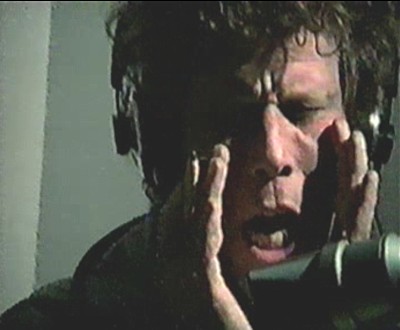
Tom Waits recording "Gospel Train". Music Factory Hamburg/ Germany, 1989(15)
Original recordings done with Greg Cohen a.o., 1989 (Music Factory in Hamburg/ Germany): The Black Rider, November, 'T 'Ain't No Sin, Crossroads, Gospel Train, The Last Rose Of Summer, Carnival.
Original recordings done with The Devil's Rhubato Band, 1989 (Music Factory in Hamburg/ Germany): Flash Pan Hunter (intro), That's The Way, The Briar And The Rose, Interlude.
Newly recorded material done with The Rhubato West Group, 1993 (Prairie Sun Recording in Cotati/ USA): Lucky Day Overture, Just The Right Bullets, Black Box Theme, Russian Dance, Gospel Train (Orch), I'll Shoot The Moon, Flash Pan Hunter, Oily Night, Lucky Day.
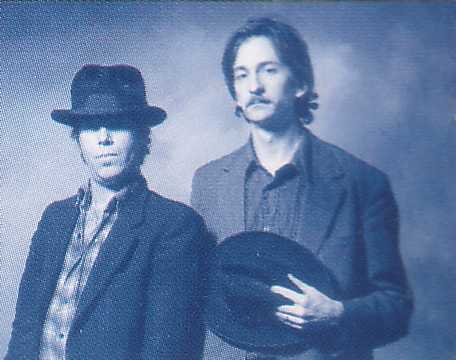
The Black Rider promo picture: Tom Waits and Greg Cohen(6)
Tom Waits: "They (The Devil's Rhubato Band) are heard on a few of the songs in this collection. But recording more with them proved to be difficult with time and distance. They were all heroic in their commitment and contribution and became the pit band I've always dreamed of."(1)
Tom Waits: "Together with The Hamburg Orchestra, the group in California and the original recordings done with Greg Cohen and Gerd Bessler, we were trying to find a music that could dream its way into the forest of Wilson's images and be absurd, terrifying and fragile. Three things I hope come across in this collection of songs."(1)
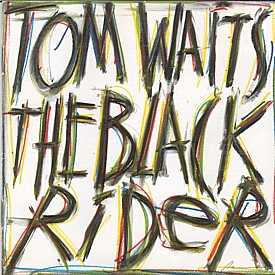
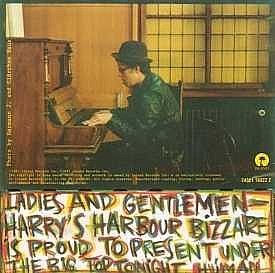
Front and back cover for the album "The Black Rider", 1993(6)
Tracklist:
1. Lucky Day Overture (2:26). Original take by Tom Waits played to open the show, then the Old Uncle starts singing it.
2. The Black Rider (3:20). Sung by Pegleg as cast is introduced in the prologue. Backing vocals by full cast (theme played in scene 10 as Wilhelm is at the Crossroads).
3. November (2:50). Sung by Robert in scene 2 (flashback scene with the roebuck stag).
4. Just The Right Bullets (3:55). Sung by Pegleg in scene 4 as he offers Wilhelm the magic bullets.
5. Black Box Theme (2:45). Instrumental played as the Black Box appears on stage (prologue).
6. 'T 'Ain't No Sin (2:35). Original Burroughs tape played in scene 9.
7. Flash Pan Hunter/ Intro (1:11). Instrumental.
8. That's The Way (1:11). Original Burroughs take played in scene 3 prior to K�tchen/ Wilhelm love duet.
9. The Briar And The Rose (3:50). Sung as a love duet in scene 3 by K�tchen and Wilhelm.
10. Russian Dance (3:10). Instrumental.
11. Gospel Train/ Orchestra (2:35). Instrumental.
12. I'll Shoot The Moon (3:50). Sung in scene 9 by K�tchen as she sits on the bed.
13. Flash Pan Hunter (3:05) Sung in scene 6 as a duet by Robert and the Old Uncle after Wilhelm has spent his magic bullets.
14. Crossroads (2:45). Spoken in German by Bertram in scene 7. Sung in English by Robert at the Crossroads in scene 8.
15. Gospel Train (4:40). Sung by Pegleg as he flies in on a chair and hands Wilhelm more bullets.
16. Interlude (0:30). Instrumental.
17. Oily Night (4:25). Original take by Tom Waits played in scene 10 as Wilhelm is at the Crossroads.
18. Lucky Day (3:45). Sung by Wilhelm in scene 11 as he goes mad after having shot K�tchen.
19. The Last Rose Of Summer (2:10). Sung by Pegleg in scene 12 as he disappears in the Black Box.
20. Carnival (1:30). Instrumental played through the entire play (scene 2 as Young Kuno is rewarded the Black Box, scene 4 as Wilhelm tries the magic bullets)
Performed in the play, but not included on the album:
"Chase The Clouds Away": Sung by Kuno portrait, K�tchen/ Wilhelm, Bertram/ Anne in scene 5. Sung by Pegleg in scene 6
"In The Morning": various versions sung by entire cast in scene 7
Tom Waits forword from the booklet for The Black Rider(1)
When I was first approached by Robert Wilson and The Thalia Theatre Of Hamburg to be involved with The Black Rider, I was intrigued, flattered and scared. The time commitment was extensive and the distance I would have to travel back and forth was a problem, but after a meeting at the Roosevelt Hotel in Hollywood. I was convinced this was to be an exciting challenge and the opportunity to work with Robert Wilson and William Burroughs was something I couldn't pass up. I had seen only one Wilson production, "Einstein On The Beach" at the Brooklyn Academy Of music, and had been pulled into a dream of such impact and beauty. I was unable to fully return to waking for weeks. Wilson's stage images had allowed me to look through windows into a dusting beauty that changed my eyes and my ears permanently. Wilson is an inventor on a journey of discovery into the deepest parts of the forest of the mind and spirit and his process of working is innocent and respectful. His workshops in stage one demand from all involved to enter his world and place as much value on the things you bring to it as the things you leave behind. I was nervous about our compatibility as his process seems so developed and was in a new country as was working in Hamburg, Germany, the Rainey Streets, church bells and the train station. Surprisingly for me our differences became our strength. Each morning I would bring to rehearsal the songs and music I had worked on the night before at Gerd Bessler's Studio. I had chosen Greg Cohen to collaborate with me on arrangements and shaping the music, selecting an orchestra, collecting sounds and recording crude tapes the night before. Greg is a multi-instrumentalist who I've had the pleasure of working with on the road and in the studio for fifteen years or more. Gerd Bessler's Music Factory was where most of the ideas for the score were born. Gerd Bessler is an extraordinary musician and sound engineer and his experience and background with The Thalia Theatre were invaluable to the work. It was his inexhaustible energy and commitment to spontaneity and adventure at his Music Factory and together we came up with fresh material each night to bring to rehearsal in the morning. Greg Cohen was a fearless collaborator, and helped me grow musically and had an endless supply of ideas with (long hours, cold coffee, hard rolls and no place to lie down). Gerd and Greg and I were the core of the music department in the early stages and we fashioned together tapes in this crude fashion, never imagining they would be released, which gave us all an innocence and a freedom to abandon conventional recording techniques and work under the gun to have something finished to bring to Wilson's carnival each morning. Although included in this collection are other recordings of the material done in California four years later, the spirit of recording in this fashion with Greg Cohen and Gerd Bessler in Hamburg was the cornerstone of the feeling of the songs. Having Wilson's theatre images to be inspired by for writing and arranging was invaluable to the process and a songwriter's dream. The Black Rider Orchestra (The Devil's Rhubato Band) were Hans-J�rn Brandenburg, Volker Hemken, Henning Stoll, Christoph Moinian, Dieter Fischer, Jo Bauer, Frank Wulff and Stefan Sch�fer. They were all from different backgrounds some came from a strict classical world, others were discovered playing in the train station and my crude way of working took some getting used to for them and I had to learn a language to communicate with them and still keep the spontaneity alive. They are heard on a few of the songs in this collection. But recording more with them proved to be difficult with time and distance. They were all heroic in their commitment and contribution and became the pit band I've always dreamed of. In California, perhaps four years later. I formed another orchestra built on the same principles as The Devil's Rhubato Band, same instrumentation to replant the seeds from Hamburg. They are featured on many of the songs: "Lucky Day", "Russian Dance", "Shoot The Moon", "Oily Night", "Gospel Train (Orch)", "Flash Pan Hunter", "The Right Bullets" and "Black Box". The group that was formed in California were all musicians from San Francisco, although we began working from charts, slowly I began to realize that to effectively continue we needed a more crude approach and soon abandoned much of the score and worked from tapes and intuition. All of the players in the "Rhubato West" group were eager to "Frankenstein" the music into something like a beautiful train wreck. We recorded in a cold shed with bad light and no breaks, in order to inject the music with new life, "Gospel Train (Orchestra)" was recorded after a frustrating day of discipline, the piece was barked out like a garage band with the whole orchestra aping like a train going to Hell, it was a thrilling moment for all of us and even the bassoonist wanted to hear the play back. They all are fearless, willing and eager musicians. Together with The Hamburg Orchestra, the group in California and the original recordings done with Greg Cohen and Gerd Bessler, we were trying to find a music that could dream its way into the forest of Wilson's images and be absurd, terrifying and fragile. Three things I hope come across in this collection of songs. The actors in The Thalia Theatre production of The Black Rider were of a caliber I had never seen in my experience: fearless, tireless, insane and capable of going to deep profound places under sometimes difficult circumstances (cold coffee. hard rolls and no place to lay down), they took the songs and brought them to life and the songs brought them to life. I had never worked as a composer who was to remain outside of the performance and teaching them the songs was an education for me as well as them. They were like old children and amazed me with their willingness and the power of the imagination this collection is me singing but inside each performance are things I learned from their interpretations. William Burroughs, was as solid as a metal desk and his text was the branch this bundle would swing from. His cut up text and open process of finding a language for this story became a river of words for me to draw from in the lyrics for the songs. He brought a wisdom and a voice to the piece that is woven throughout. Somehow this odd collection of people resulted in an exciting piece of theatre that became an enormous success in Hamburg at the Thalia, and has travelled throughout the world and is still running today and it was a privilege to be a part of it.
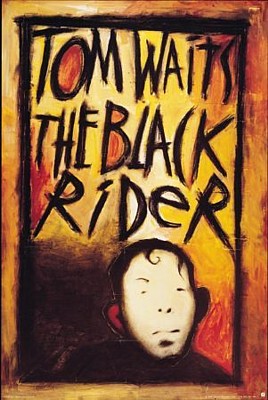
Poster promoting the release of the Black Rider album
Island Records, Inc., 1993. 314 510 559 POS 1
Painting: Christie Rixford
Greg Cohen (2002) on the Devil´s Rubato Band: "There I was ... alone in Hamburg with a box filled with cassette tapes of musicians from all over Germany. I had an appartment across from the Groß Neumarkt. Putting on my raincoat, I sloshed across the street to buy some dark bread, eggs and about 80 grams of wild mushrooms, then went home and listened. By the end of the day I had consumed 20 tapes, 2 loaves of bread and a half bottle of aspirin. I was dumbfounded. After sautèning the mushrooms I listened back to the tapes that I liked best. It was getting late and I was fried. As I lay in bed, I thought of the film The Magnificent Seven. You know the story. In order to save this little Mexican pueblo from the barbaric banditos, the towns people had to procure the best guns in the land. These 7 men all had different takes on gunslaying. Some were boisterous braggarts. Other were quiet and lethal. They came from the deserts of the north, the gin mills of the Texas border, seclusion of the mountains. Alone they were outlaws. Together they were a killing machine. Wasn´t this what was needed for The Black Rider? Musicians from all different disciplines and backrounds. They didn´t need to shoot fast, but had to be able to handle a trombone, clarinet or marimba at breakneck speed. To be able to hold their own as a soloist, as well as melting together in an ensemble capable of transcending mere notes on paper. I hopped out of bed and put on the tapes marked Stoll...Wulff...Fischer...Brandenburg, etc. These 8 would not only help create a soundscape, but help to put the magic and fire into the story, that was to become The Black Rider. After the show was up and running, something strange and wonderful happened. Something, frankly I never expected would happen, happened. This group of 8 musicians became more than just the pit orchestra for a piece of musical theatre, they became a band! An art unit with a shelf life all its town. They dubbed themselves “The Devils Rubato Band”. This was but the beginning of their saga. The musicians: Henning Stoll, Dieter Fischer, Stefan Schäfer, Jörn Brandenburg, Frank Wulff, Jo Bauer, Christoph Moinian, Volker Hemken..."(19)
Marianne Faithfull (2004): "The Black Rider is the last thing Burroughs wrote certainly the last thing he wrote after The Western Lands, the novel about Egypt, which I love. I know Burroughs's work very well, and he threw a lot from it into The Black Rider: there is a lot of The Last Words of Dutch Schultz, and some of The Black Rider's imagery is from Naked Lunch. Tattered clouds is one of his images, and there are a lot of tattered clouds in The Black Rider. By using an old folk tale, William was really able to write about himself. The main character, who takes the Devil's deal that ultimately results in the death of his sweetheart and bride, is called Wilhelm. So it's not very disguised, but disguised enough for William to have done it. His wife Joan's shooting, in 1951, was about addiction. It wasn't that he wanted to kill her or didn't love her. It was because of addiction. And Pegleg the Devil the character I play in this new production is the metaphor for that. William makes it a tangible creature, whereas, in fact, the Devil is a part of him. In the play, you see that Pegleg is a part of Wilhelm. He's another side of Wilhelm, the famous old dark side. The Black Rider is very close to the Elizabethan plays, particularly to Christopher Marlowe's Doctor Faustus. It is also surrealistic in many ways. William and the artist Brion Gysin adopted the cut up techniques of the Surrealists and made them work brilliantly. I cannot stress enough how much Brion, William, Andre Breton, and Louis Aragon are connected. . I first read Burroughs when I was very young, and didn't understand it all. What I did understand and continued to recognize in all his books, and through his life was his incredible lyrical quality. His work is almost like poetry. That lyrical beauty really steps up to the parapet in The Black Rider. The rhymes are spell like: "That's the way the rocket crashes, that's the way the whip lashes, that's the way the potato mashes." I can see he had a hand in the songs for the stage production, especially the songs for Pegleg. They're full of Burroughsian stuff. Which they would be, because his interest lies in Wilhelm and Pegleg more than anything. I saw the first production of the show in 1991 and thought it was one of the most fascinating bits of theater I had ever seen. It has everything ancestor worship, magic, a love story, sound, and movement. William saw it on its first night in Hamburg; it was very lucky that it was staged when he was still around. The new production will be similar, but the director, Robert Wilson, is changing it to suit the new actors. This is the first time I've worked with Wilson, and this is a completely new theatrical language for me: it's not naturalistic, it's unnaturalistic, all about space and how you use it. It's like being in the middle of a whirlwind. One of the most powerful things about this production is that we'll be using recordings of Burroughs speaking and singing "T' Aint No Sin." I'm not in that scene but I have sat and watched it in rehearsals. When it came to the bit with William's voice I got very emotional. Of course, there's a part of me that is honoring my old friend William. I feel very lucky to have got the role and I'm not going to let William down." (14)
Notes:
(1) Foreword by Tom Waits for the album "The Black Rider". Los Angeles, September, 1993. (P) & � 1993 Island Records, Inc.
(2) Theatre program book published by: Thalia Theater GmbH, Alsertor, 2000 Hamburg 1/ Germany. Direction: J�rgen Flimm, Rolf paulin, Ludwig von Otting, Klaus Zehelein. Editors: Wolfgang Wiens, Sergio Morabito. Special thanks to Kees Lau from The Netherlands for sharing his "The Black Rider, 1990" theatre program.
(3) Source: � EFF "William S. Burroughs" Archive. As published on: http://residence.aec.at/
(5) Source: Jan Linders. Interview, August 1992; published in Convidados de Piedra, Madrid 1992. As published on Robert Wilson official site.
(6) Album cover concept and art by Robert Wilson. Design: Christie Rixford. Photography: Paul Schirnhofer, Ralf Brinkhoff, Herman J. and Cl�rchen Baus. (P) & � 1993 Island Records, Inc. The copyright in this sound recording and artwork is owned by Island Records Inc. and is exclusively licensed to Island Records Ltd in the UK. � 1990, 1993 Jalma Music, Inc. except: "That's The Way", " Flash Pan Hunter" and "Crossroads" � 1990, 1993 published by Jalma Music, Inc./ Nova Lack Music (ASCAP). "Ain't No Sin" � 1992 Edgar Leslie, published by Laurence Wright Music Co. Ltd/ EMI Music Publishing Ltd.
(7) Source: "Another Night at the Opera for Waits". Tom Waits discusses his latest collaborative foray into musical theater. By: Andrew Dansby. November 4, 2000. � 2001, RollingStone.com.
(8) Source: "Tom Waits: Mojo Interview". Mojo p. 72-85: Barney Hoskyns. April, 1999
(9) Barbican Theatre. London/ UK 2004 program book. Produced by BITE04 and Cultural Industry
(10) Source: "Words On Plays: Insight into the play, the playwright, and the production. The Black Rider." American Conservatory Theater, 2004. Carey Perloff, Artistic Director. Heather Kitchen, Executive Director. Prepared by: Elizabeth Brodersen, Publications Editor. Jessica Werner, Associate Publications Editor. Paul Walsh, Resident Dramaturg
(11) Source: Interview by Raymond Foye, originally published in Grand Street 37 (1990): 93 108. Also published in "Burroughs Live: The Collected interviews of William S. Burroughs 1960 1997", edited by Sylv�re Lotringer. Semiotexte, 2001
(12) Source: 'Walking Out of the Pages," by Klaus Maeck, originally published in Kozrnik Blues (1990): 9 15. Also published in "Burroughs Live: The Collected interviews of William S. Burroughs 1960 1997", edited by Sylv�re Lotringer. Semiotexte, 2001
(13) Source: "Afterlife" by Eldon Garnet, originally published in Impulse (March 1990) 15:4. Also published in "Burroughs Live: The Collected interviews of William S. Burroughs 1960 1997", edited by Sylv�re Lotringer. Semiotexte, 2001
(14) Source: "The Devil? That Was His Own Dark Side", interview with Marianne Faithfull, by Tim Cumming. The Guardian (London). May 12, 2004. Copyright @ 2004 Guardian Newspapers Limited.
(15) Source: Screenshot from German TV documentary Der Schwarze Reiter. WDR, 1990. Tom Waits and Greg Cohen in the studio recording Gospel Train
(16) Source: Encore Arts Programs. August/ September 2004. Volume 11, Issue 1. Published for American Conservatory Theater.
(17) Source: "Theater: Strange 'Magic'". The Orange County Register (USA), by Paul Hodgins. April 26, 2006
(18) Source: partly taken from Robert Wilson official site.
(19) Source: Devil�s Rubato Band page at Stefan Sch�fer official site, 2002 .


